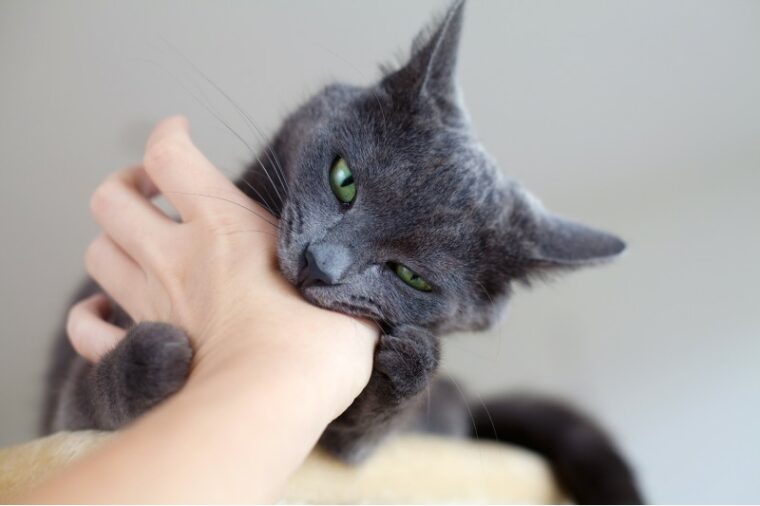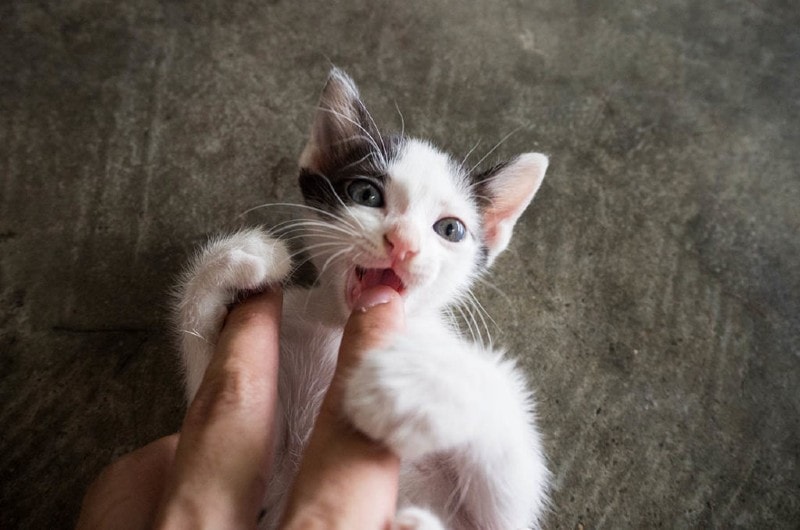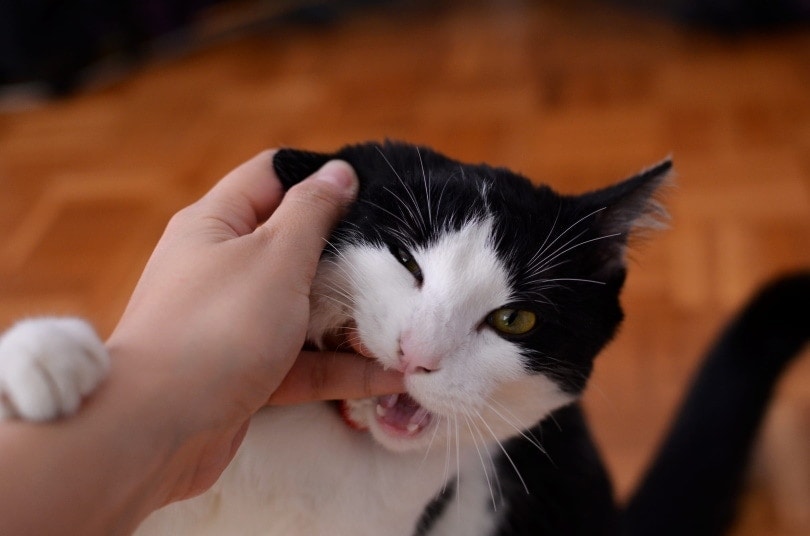
There are few things more frustrating than when a cat unexpectedly bites1 you. It’s even more confusing when your cat has never shown any aggression before. Biting is just one way your cat has to communicate their feelings.
First, it is important to check if your cat has any medical issues, such as stomach trouble, back pain, pulled muscles, or skin conditions that might make them react aggressively to touch. If you suspect something is medically wrong, check with your vet to rule out any serious conditions.
Once you know your cat is not in any pain, you can begin to unlock its behavior and learn what they are trying to say. So if you’re wondering why your cat suddenly started biting, here are six possible explanations why.
The 6 Reasons Why Your is Cat Biting You All of a Sudden
1. Playfulness
Perhaps the most common reason your cat will bite is not a negative one but rather the simple reason of playfulness! Cats are social animals, and one of the ways they play with each other is to jump, scratch, nip, and claw. This is not intended to be aggressive, though it can feel that way if you were not expecting a bite. Rather it is a natural way they hone their hunting skills and socialize with each other.
A cat can play in a relatively low-key way and then, suddenly explode into a more intense attack. If this is the case, you might want to take a look at how you play with your cat. If you are using your hands and arms to play, by waving your hands around or letting your cat chew on you a bit, this teaches them that it is ok to engage with you fully.
You can keep pet toys around and play with them instead, which helps to train your cat to direct their playfulness at the toy. Also, if you see them getting too wound up, you can de-escalate the play and begin using soothing pets to bring them back down to a more low-key state. These techniques establish good boundaries and teach your cat to treat you gently and calmly.
2. Redirected Aggression
Aggression is a natural part of a cat’s behavior and how they defend their territory and personal space. When they redirect their aggression, something has triggered their fight or flight response, and you become the outlet for their attack.
Think about it this way, another strange cat has entered the room, intruded into your cat’s territory, and your cat slinks down with its shoulders thrown forward, its ears pinned back, and its tail cutting back and forth. You might have missed these cues or merely be in the wrong place while your cat is defending their space. You reach to pet them, and they pounce on you, redirecting their defensive stance, frustration, and fear by biting you.
For your cat to feel safe and secure, it is important to understand that they need their territory. In the scenario just mentioned, it would be best if no other cat comes into their home turf, and yet if this is not possible, then it is important to slowly acclimate them to any new cats, other pets, people, or children entering the home.
Pay attention to cues from your cat. If you see them exhibiting signs of aggression, don’t intrude on their space by touching them. Let them calm down in their way and provide the space they need to find their equilibrium again.
3. Teething Pain
Kittens bite and nip all the time! They are used to being in a litter with their brothers and sisters and tumbling about biting and playing. They are also used to squirming in to find milk from their mother. These behaviors (in addition to the fact that your kitten is also developing their teeth) mean they will bite and constantly chew as a natural part of their behavior.
Their baby teeth, or milk teeth, come out when they are three to four weeks old. Just like humans, these baby teeth don’t last and come out again at around three to four months of age for the cat. When your kitten is teething, it may be excessively chewing or show signs of irritability.
Their mouth is sore, and chewing and biting help them to relieve this pain and help the new teeth emerge. If your cat is biting you at this time, it is important to understand that this is a phase of their development and not a permanent part of their personality.
You can help your kitten with teething by getting them to chew toys, especially those made from soft materials, leather, or healthy chew treats.

4. Petting-Related Aggression
If you have a kitten, it may be going through a biting phase due to teething, but if your adult cat is biting you unexpectedly while you are petting it, it may be communicating a different message. Watch how you are petting them. Maybe some strokes evoke an unexpected nip. This is their way of telling you what they don’t like.
It can be confusing! They are purring, enjoying themselves, and then it turns to aggression and scratching or biting. This can be due to several factors. In general, cats like to groom each other by licking each other’s ears, face, chin, and neck areas. This makes sense, as these are the areas they can’t clean by themselves!
Some cats do not like you to touch their backs, bellies, tails, or feet. As a species, cats exhibit a wide range of preferences and vary from cat to cat in how much they like to be pet and handled. If they do bite, it is a clear message to you about what your cat prefers.
The other option is that if your cat seems unusually wound-up and anxious about being pet and this seems out of the ordinary, you can train them to relax a bit more during petting sessions. Use treats and positive feedback to slowly acclimate them to being handled.
5. Fear-Based Biting
Loud noises, such as fireworks, cars, thunderstorms, or slamming doors, can frighten your cat. This will trigger their natural flight or flight nervous system response. Flight is typically what we expect from our cats; they run into the bedroom and dive into the deepest darkest corner under your bed. As they flee the perceived threat, their nervous system releases its tension, and hiding brings them back to a place of safety and calm.
If your cat is not able to flee or you chase after them, then their fight response will be activated. Reaching under the bed to grab them while they are triggered and alert to fear can result in an unpleasant bite or scratch for you.
If you see your cat is in fear, leave them alone to calm and soothe their nervous system on their own if possible. When you intervene, you can become the target of their fear, and it can result in unexpected aggression. Cats are typically adept at bringing themselves back to a state of nervous system regulation and self-soothing.

6. Grooming
Biting and licking are a natural part of the grooming process. Typically, your cat will use its front teeth to pry loose any difficult knots or balls in their fur through repeated biting and chewing. As they move over the surface of their fur, they may be licking, biting, and chewing large areas of their coat.
If you pet them while they are grooming, there is a good chance you will get nipped. They also love to groom their human partners as a sign of affection. This may just be a sand-paper scratchy tongue licking your arm, but they may also nip at your skin if they are in that same mode of detangling their fur. This is normal, and if you don’t like the sensation, it is entirely avoidable if you leave them be at grooming time.
 Conclusion
Conclusion
There are many reasons your cat might bite you unexpectedly. If your cat bites you unexpectedly, pay attention to its body language and try to figure out what might be causing the behavior. The good news is that there are many ways to redirect your cat from biting behavior, from avoiding them at certain times to retraining them not to bite. And, of course, always consult with your veterinarian if you’re concerned about your cat’s health or behavior.
Featured Image Credit: Diana Taliun, Shutterstock


 Conclusion
Conclusion 



